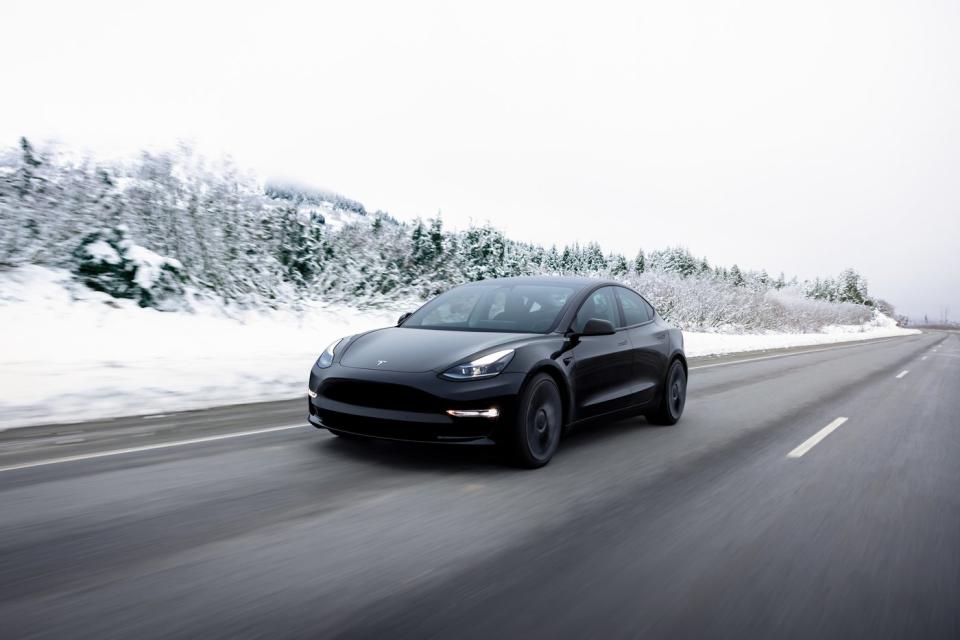Tesla (NASDAQ: TSLA) didn’t have a lot of good news to share with investors in its first-quarter earnings report this week.
As the company said in its summary, challenges including the Red Sea conflict, an arson attack at its factory in Berlin, and the ramp-up of its updated Model 3 all added to costs and weighed on performance.
The company also noted industrywide challenges in electric vehicles (EVs) as EV sales seem to have plateaued in the industry. Tesla already reported a 9% decline in first-quarter deliveries and Q1 revenue was also down 9% to $21.3 billion, missing the consensus at $22.15 billion. Automotive revenue was down even more sharply, falling 13% to $17.4 billion, a function of price cuts in both the industry and at Tesla.
Those price cuts led to a sharp decline in operating margin from 11.4% to 5.5% and adjusted earnings per share slipped from $0.85 to $0.45, below analyst estimates at $0.51.
Despite the weak results, Tesla stock soared after hours, closing the extra session up 13.3%. CEO Elon Musk pulled off a familiar sleight of hand, focusing investor attention on future products rather than current struggles. His pitch was enough to reinvigorate the stock price.


“We should be thought of as an AI or robotics company”
Much of the earnings call focused on the company’s goal of achieving vehicle autonomy, or full self-driving, FSD for short.
Musk essentially staked the company’s future on FSD, saying, “If somebody doesn’t believe Tesla is going to solve autonomy, I think they should not be an investor in the company.” He also envisions a future where FSD allows Tesla owners to lease out their cars, adding value to them, driving demand, and building a whole new business for Tesla as it operates its own autonomous ride-sharing network.
In fact, Musk’s comment above about the company deserving of being valued as an artificial intelligence (AI) company rather than an automaker shows he sees a future beyond just EVs, and it’s clear why he said that.
Even after Tesla stock has tumbled this year, it still trades at a substantial premium to other conventional auto stocks like General Motors, Ford Motor Company, and Toyota. Part of that premium owes to Tesla’s status as a pure-play EV maker as EVs are seen as the future of the industry. However, with EV sales growth now stalling and price competition weighing on margins, the EV growth story seems to have been dialed down substantially. Tesla acknowledged that its vehicle volume growth rate “may be notably lower” than in 2023.
Given those challenges, a greater portion of Tesla stock’s premium may now stem from its potential in AI and full self-driving.
All eyes on FSD
As Musk sees it, Tesla is in pole position in the autonomous vehicle race because it has more than 5 million cars on the road. The company can virtually flip a switch to enable them for full self-driving when the technology is ready. Musk promised: “It’s only a matter of time before we exceed the reliability of humans in not much time with that. And we’re really headed for an electric vehicle and autonomous future.”
The opportunity in autonomous vehicles is likely massive, but it’s a mistake to assume that Tesla will have this market to itself. Alphabet‘s Waymo has racked up millions of rider-only miles in the cities where it’s offering autonomous ride-sharing, which now include Phoenix, San Francisco, and Los Angeles.
Other automakers like GM and Ford have their own self-driving technology, and plenty of tech companies are also involved in the AV race, like Amazon‘s Zoox and Intel‘s Mobileye.
Outside of Musk’s own conjecture, there’s little evidence that Tesla is leading the FSD race. For example, last year Consumer Reports ranked Ford’s BlueCruise AV technology ahead of Tesla’s. In fact, the renowned product-testing service said GM, Mercedes-Benz, BMW, Toyota, and Volkswagen all topped Tesla in self-driving technology.
That doesn’t mean Tesla’s technology isn’t on the verge of a significant breakthrough, but investors should take Musk’s words with a grain of salt.
The Tesla CEO is mercurial, and he’s prone to hyperbole. While he’s clearly a visionary leader and deserves more credit than anyone for taking EVs mainstream, he’s also overpromised on a number of occasions.
If FSD evolves the way Musk envisions it, it would certainly be a game changer for the company, but investors should be aware that a considerable premium is already priced into Tesla stock. As Musk said himself, at this point, investing in Tesla stock seems to be more of a wager on Tesla’s potential in full self-driving than anything else, and that can swing both ways.
Where to invest $1,000 right now
When our analyst team has a stock tip, it can pay to listen. After all, the newsletter they have run for two decades, Motley Fool Stock Advisor, has more than tripled the market.*
They just revealed what they believe are the 10 best stocks for investors to buy right now… and Tesla made the list — but there are 9 other stocks you may be overlooking.
*Stock Advisor returns as of April 22, 2024
Suzanne Frey, an executive at Alphabet, is a member of The Motley Fool’s board of directors. John Mackey, former CEO of Whole Foods Market, an Amazon subsidiary, is a member of The Motley Fool’s board of directors. Jeremy Bowman has positions in Amazon. The Motley Fool has positions in and recommends Alphabet, Amazon, Tesla, and Volkswagen Ag. The Motley Fool recommends Bayerische Motoren Werke Aktiengesellschaft, General Motors, and Intel and recommends the following options: long January 2025 $25 calls on General Motors, long January 2025 $45 calls on Intel, and short May 2024 $47 calls on Intel. The Motley Fool has a disclosure policy.
For Tesla Stock Investors, There Are Only Three Letters That Matter was originally published by The Motley Fool














